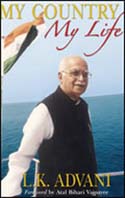Feb 13, 2026
Feb 13, 2026
 L.K Advani's walk down memory lane is proving to be too bumpy for comfort. The release of his memoirs "My Country, My Life", coming close on the heels of the launch of his prime ministerial candidature by his party has opened up an unexpected can of worms.
L.K Advani's walk down memory lane is proving to be too bumpy for comfort. The release of his memoirs "My Country, My Life", coming close on the heels of the launch of his prime ministerial candidature by his party has opened up an unexpected can of worms.
The flood of controversy threatening to swamp the author has come at a time when the Bharatiya Janata Party (BJP) leader was all revved up to answer the final call. He had finally got the backing of his party for the top job in the country that he had been eyeing for long.
But his memoirs are messing up his credibility, ruining the one label he badly wants to flaunt - of being the perfect commander who is ahead of every crisis, particularly the crisis wrought by terrorism. The book is raising a question mark over Advani's ability to lead the nation, especially because at the core of the controversy lies the Kandahar hijack issue and Advani's role in it as the home minister then.
Apart from the Kandahar incident, Advani's memoirs are inflicted with a rash of gaffes, a result of shoddy research. It must have given the BJP's prime ministerial candidate a few blushes to be told that Satya Pal Dang, a leader of the Communist Party of India (CPI) whom he pronounced dead in the book, is alive and kicking in Punjab.
Or to be tutored on the execution of freedom fighters Bhagat Singh, Rajguru and Sukhdev. Contrary to Advani's research that the three were executed for hurling bombs inside the Delhi assembly, the freedom fighters were put to death in the Lahore conspiracy case.
But the shrill sparring over the Kandahar hijack has wounded Advani where it hurts most. It has botched up the image he wanted to graft on himself - a 'iron man' - a resolute home minister - in the mould of Sardar Vallabhbhai Patel, independent India's first home minister and deputy prime minister.
By his own admission made in his autobiography and a slew of interviews later, Advani, then home minister of the National Democratic Alliance (NDA)-led government, was unaware of the fact that his colleague and then external affairs minister, Jaswant Singh, was being sent to Kandahar to ensure safe passage for three terrorists and the hijackers who were holding to ransom the lives of 160 passengers, on board IC 814.
Advani inadvertently has revived dark memories of the hijack drama that was played out before a stunned nation nine years ago.
In an interview to a television news channel, the BJP leader said: "I don't think I am answerable for that (sending the foreign minister with the terrorists), if the committee on security had taken a decision."
Prodded whether he knew of the decision, Advani responded: "I didn't know about it. I came to know when he (Jaswant) was going."
For a former home minister who strongly favoured the "hot pursuit" theory of crossing the Pakistan border to smash terror camps, Advani's admission of ignorance of such a crucial event lands him in a spot.
Worse still, George Fernandes, the then defence minister, has called Advani's bluff by pointing out that the decision to send Jaswant Singh to Kandahar was taken in the presence of Advani.
If the book set the stage for a flurry of controversies, more revelations, made later by the author in various media interviews, added to the spice. The Congress, having got its claws into none other than the BJP's prime ministerial candidate, is waiting for the kill.
But Ravi Shankar Prasad, a senior BJP leader, like others in his party, has adopted aggression as the best form of defence. "The Congress has no face to talk about terrorism. Most of the ills of terrorism from Bhindranwale to Maoism began with the party," he said.
Responding to Sonia Gandhi's blistering attack at a public rally on Advani on Kandahar, Prasad said: "Sonia Gandhi has no experience in politics. How can she comment on somebody with 50 years of experience?"
But underneath the BJP's "all is well" response, there is a snip of uneasiness, triggered by its prime ministerial candidate's book. And spokesman Mukhtar Abbas Naqvi hopes that the controversy will die down.
"Controversies have their own life. They will die down after some time," he said.
For the moment, however they are multiplying by the day.
06-Apr-2008
More by : Monobina Gupta